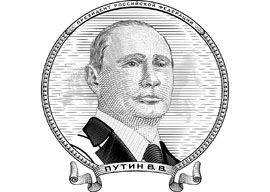
January 13, 2017

Source: Bigstock
Orwell once wrote that he had never managed to dislike Hitler personally; there was something pathetic and hangdog about his face. I feel a bit like that about Vladimir Putin. For all I know he may have had a blissful childhood, but he looks as if he might have been a neglected little boy, always unsure of himself. It’s as if the macho posturing”the famous photograph of him bare to the waist on horseback, for instance”represents some sort of compensation activity.
Be that as it may, no one can deny that he has made himself into the most effective Russian leader since Stalin. He isn”t, of course, a mass murderer like Stalin, or indeed Hitler. Putin’s Russia isn”t a totalitarian state. It’s an old-fashioned autocracy. He may regard the dissolution of the Soviet Union as the greatest geopolitical disaster of the 20th century, but he has ditched Communism, doesn”t even pretend any loyalty to Marxist-Leninist philosophy (despite”or because of?”his KGB background). Instead he has reconstructed something like the pre-Revolutionary Tsarist regime, authoritarian and even religious. Who would have thought half a century ago that the Russian Orthodox Church would again be such a power in the land? Putin may himself have no religious faith, but he values the moral support that the Church gives to his regime.
Putin’s style of presidential quasidemocracy may not be to our taste. The regime is hostile to Western-style liberalism and skeptical of human rights. Only “loyal” opposition is tolerated. Awkward dissidents and journalists critical of Putin tend to disappear, conveniently murdered. Nevertheless there aren”t concentration camps, and convicted critics are released when they have served their sentence. Corruption and theft of state assets are rife. In truth Putin’s Russia bears more resemblance to Mussolini’s Italy or Franco’s Spain than to the old Soviet Union.
None of this really matters much to us. The internal affairs of Putin’s Russia are a matter for the Russians, and the majority seem to approve of the regime and of Putin himself. As far as such things can be fairly judged he remains popular, perhaps as popular as Mussolini was till he foolishly took Italy into the European War. No Italian leader has been as popular as Mussolini was in his heyday, and Putin may be in a similar position. Few certainly doubt that he would win an election with no real need to rig it.
For us in the West, it’s Putin’s foreign policy and what he does beyond the borders of Russia that matters and is of genuine concern. It may be years before the full facts of Russian hackers” intervention in the American presidential election, and of Putin’s responsibility for this, are established, but what we can”t doubt is that the Russian bear, after almost thirty years of licking its wounded paws, is once again a big player in the field of international relations.
Not all his foreign adventures are reprehensible. I think he was right to back Assad in Syria, and the West wrong to support the various rebel groups. Whatever the iniquity of the Assad regime, it always seemed likely to be preferable to any alternative, for that would probably have taken an Islamist form. We can live happily with Islam but not with Islamism; there is a real distinction between them.
In Europe it seems improbable that Putin will relinquish his grip on Crimea. He will doubtless continue to offer some support to the separatists in Eastern Ukraine; but this will remain limited. We should recognize that Western policy on Ukraine was regarded as provocative by Russia, Putin believing that, by dangling the prospect of membership in the E.U. and NATO before the Ukrainians, the West was encroaching on a legitimate Russian sphere of influence.